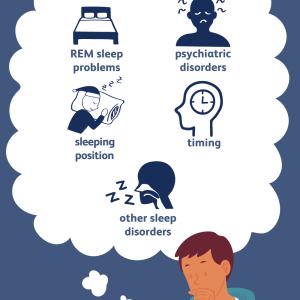Introduction Sleep paralysis is a fascinating yet unsettling phenomenon that affects individuals during the transition between wakefulness and sleep. It can be a frightening experience, leaving those who encounter it feeling helpless and terrified. In this comprehensive guide, we delve into the causes, symptoms, and available help for managing sleep paralysis. What is Sleep Paralysis?
Introduction
Sleep paralysis is a fascinating yet unsettling phenomenon that affects individuals during the transition between wakefulness and sleep. It can be a frightening experience, leaving those who encounter it feeling helpless and terrified. In this comprehensive guide, we delve into the causes, symptoms, and available help for managing sleep paralysis.
What is Sleep Paralysis?
Sleep paralysis is a temporary inability to move or speak while falling asleep or waking up. It occurs during the REM (rapid eye movement) stage of sleep when the brain is active, but the body remains immobile. This phenomenon disrupts the normal sleep cycle, leading to a state where the individual is conscious but unable to move.
Causes of Sleep Paralysis
Several factors contribute to the occurrence of sleep paralysis, including:
Disrupted Sleep Patterns
Irregular sleep schedules or insufficient sleep can increase the likelihood of experiencing sleep paralysis. Disruptions to the natural sleep-wake cycle can lead to abnormalities in REM sleep, triggering episodes of paralysis.
Stress and Anxiety
High levels of stress or anxiety can exacerbate sleep disorders, including sleep paralysis. Psychological factors play a significant role in disrupting sleep patterns, making individuals more susceptible to experiencing paralysis during sleep.
Narcolepsy
Narcolepsy, a chronic sleep disorder characterized by excessive daytime sleepiness and sudden attacks of sleep, is closely linked to sleep paralysis. Individuals with narcolepsy often experience episodes of paralysis as they transition between wakefulness and sleep.
Genetics
Genetic predisposition may also influence susceptibility to sleep paralysis. Certain genetic factors can affect the regulation of REM sleep, increasing the likelihood of experiencing episodes of paralysis during sleep. Explore More About (Swelling Ankles)

Image by: yendex.com
Symptoms of Sleep Paralysis
The hallmark symptom of sleep paralysis is the temporary inability to move or speak while transitioning between sleep stages. Additional symptoms may include:
- Sensation of pressure on the chest
- Feeling of being choked or suffocated
- Visual or auditory hallucinations
- Sense of impending doom or terror
These symptoms can vary in intensity and duration, with some individuals experiencing brief episodes lasting only a few seconds, while others may endure prolonged periods of paralysis accompanied by vivid hallucinations.
Coping with Sleep Paralysis
While sleep paralysis can be a distressing experience, there are several strategies that individuals can employ to cope with and mitigate its effects.
Maintain a Consistent Sleep Schedule
Establishing a regular sleep routine can help regulate the sleep-wake cycle and reduce the frequency of sleep paralysis episodes. Aim for consistent bedtimes and wake-up times, even on weekends, to promote healthy sleep patterns.
Manage Stress and Anxiety
Practicing relaxation techniques such as deep breathing, meditation, or yoga can help alleviate stress and anxiety, making it easier to fall asleep and reducing the likelihood of experiencing sleep paralysis.
Improve Sleep Environment
Create a comfortable and conducive sleep environment by ensuring that your bedroom is dark, quiet, and free from distractions. Invest in a supportive mattress and pillows to promote restful sleep and minimize disruptions during the night.

Photo by: unsplash.com
Seek Professional Help
If sleep paralysis persists or significantly impacts your quality of life, consider seeking assistance from a healthcare professional. A sleep specialist can conduct a comprehensive evaluation, identify underlying sleep disorders, and recommend appropriate treatment options.
Coping Strategies for Sleep Paralysis
| Coping Strategy | Description |
|---|---|
| Maintain a Consistent Sleep Schedule | Establish a regular sleep routine to regulate the sleep-wake cycle and reduce episode frequency. |
| Manage Stress and Anxiety | Practice relaxation techniques such as deep breathing, meditation, or yoga to alleviate stress. |
| Improve Sleep Environment | Create a comfortable bedroom environment conducive to restful sleep with proper lighting and bedding. |
| Seek Professional Help | Consult with a healthcare professional or sleep specialist for comprehensive evaluation and treatment options. |
Conclusion
Sleep paralysis is a perplexing phenomenon that can disrupt the sleep of those who experience it. By understanding its causes, recognizing its symptoms, and implementing effective coping strategies, individuals can navigate through episodes of sleep paralysis with greater ease and regain control over their sleep patterns. Remember, while sleep paralysis can be unsettling, it is typically harmless and can be managed with proper care and attention to sleep hygiene.
















